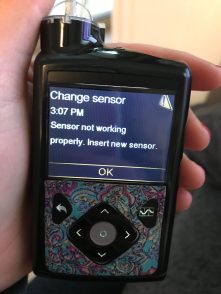One of the tips that the National Sleep Foundation recommends for a good night sleep is to have a relaxing bedtime ritual. It’s meant to serve as a type of buffer to separate your sleep time from the rest of your busy day and to signal to your body that it’s time to relax and prepare for sleep.
I was thinking about my own bedtime rituals and how they’ve changed over the years. When I was very young, my bedtime ritual consisted of my parents coming to tuck me into bed and probably reading me a bedtime story. When I was a little older, I added a new piece to the ritual, my parents would kiss me goodnight and then kiss my stuffed animal too. These were simpler, pre-diabetes times.
When you think of everything you do before bed, some of it you do because you know it’s good for you and your health, some of it you do because you have to, and some because you want to. Brushing your teeth, flossing, washing your face, these are all ways to take care of your body and your health. Taking medication or checking your blood sugar before bed are important rituals that can’t be forgotten. Reading, listening to music, meditating, cuddling your partner or your pet, these are things that you enjoy doing. Taken together, all of these activities become your bedtime ritual, changing as you grow and age.
I started thinking about this topic right before bed because of my newest additions to my ritual. Every night after I check my blood sugar, I calibrate my sensor on my pump. The calibration lasts 12 hours at best, so I want to make sure that it lasts through the entire night. This is something that I didn’t have to do with my old pump, but I’ve gotten used to doing it. But then, I go into my settings and silence all my alarms for the next 10 hours. I had to add this piece to my ritual because while calibrations should last 12 hours, many nights it would last closer to 6, and I was getting tired of being woken up at 4 am to buzzing telling me to calibrate. And worse, you can only snooze that alarm for an hour before it will go off again. So your only option at that point is to go test your blood sugar and re-calibrate, or continue to snooze and be woken up every hour. (Even with alarms silenced, it will still buzz for low blood sugars, so I feel comfortable implementing this work around every night).
But what category does this activity fall into? It’s not something that’s good for my health since essentially I’m ignoring alarms that are going off for a reason like alerting me of high blood sugars (although it is good for my sleep), it’s not something that I have to do, or something that I enjoy doing. This work around for a flaw in the technology has made its way into my nightly bedtime routine, but every night as I silence the alarms so I can get undisturbed sleep, I think to myself how I shouldn’t have to be doing this extra step. The failure of the sensors lasting the full night has resulted in more time and effort being required from me. It’s a small addition, but small additions add up. And instead of feeling calm and relaxed before bed, the little step adds a bit of annoyance and frustration each night.
There are many features of this Medtronic 670G insulin pump that I find annoying, this being one of them. But I’m learning to focus on what is within my control right now. I can’t always control when my pump is going to require a calibration, but I can control the level of interference with my sleep. Instead of feeling annoyed but this extra step, I try to feel empowered by my ability to make this device fit my needs and lifestyle instead of having its buzzes and beeps negatively affect my quality of life and sleep.
Really, my bedtime routine is kind of a metaphor for life itself. It’s made up of a combination of activities I like to do, some that I don’t necessarily enjoy but I know are good for me, and frustrations or challenges that I do my best to control or overcome. And yes, it would be simpler or more enjoyable if my routine was only things I enjoyed doing, but it’s the mix of the “want to”, “have to”, “try to”, that best prepares me for sleep…and life.


 Yesterday, after wearing the sensor for 3 days, I got a message that the sensor was updating and then a message that said, “Change sensor. Sensor not working properly insert new sensor.” In that moment I was furious. I screamed obscenities in my head at my sensor and texted my boyfriend the picture of that screen with 10 emojis of the middle finger and angry faces.
Yesterday, after wearing the sensor for 3 days, I got a message that the sensor was updating and then a message that said, “Change sensor. Sensor not working properly insert new sensor.” In that moment I was furious. I screamed obscenities in my head at my sensor and texted my boyfriend the picture of that screen with 10 emojis of the middle finger and angry faces.